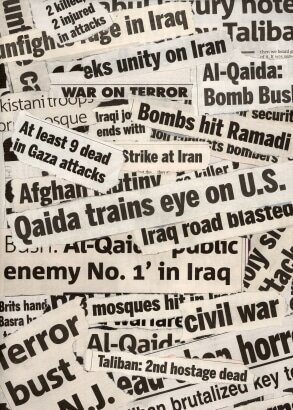Seventy years ago today the British Prime Minister, Neville Chamberlain, declared war on Germany at 11.15am in an address to the nation on the radio. It was the first such public declaration of war, but not the last. George Bush declared his “war on terror” on 21st September 2001, live on television. The next war will probably be announced online, perhaps on Twitter, since the military establishment has already built “cyberwar” initiatives, where much of the fighting will be done on the Internet.

Yet, you might think the Internet could help prevent wars. After all, it is the biggest, speediest, most open communications system we have ever had available. The reason Chamberlain went to war against Hitler was because the German government failed to communicate; their silence started the war. If only communication had taken place, history may have been altogether different. This is a point not lost on last year’s Nobel Prize for Literature winner, Jean-Marie Gustave Le Clézio, who said in his speech following the award that the Internet may actually help prevent wars. He was making the point that Hitler would not have succeeded in getting his message across had the Internet been around because opposition would have more easily surfaced.
That was the case recently in Iran, where the Internet – especially Twitter – was used to mobilise people against the Tehran establishment. Even so, the popular uprising was defeated; the power of the Internet was no match for the political elite. In the end, the opposition and the rulers will have to talk. So too will the West and the Taliban. It was talking that stemmed the tide of destruction in Northern Ireland, after all. No matter which war you think of, in the end, it all comes down to communication. Which means the Internet must have a role because it is such a powerful communications tool.
Yet the political powers which could use the Internet as a means of reducing conflict appear to spend all of their waking moments plotting on how they can use the web to create conflict. Indeed, we get a raft of politically derived reports telling us how bad the Internet is for us, how Facebook will be our downfall, how children are being turned into monsters – none of which has any evidence to support it. The fact is, politicians have realised that the Internet removes power from them. The only way they can remain in power is to ensure we all think the Internet is downright dreadful. And when politicians are in power, the only way they can remain powerful is war.
In the end, the Internet is creating a war between the people and their rulers. And that means, that eventually, the political elite will have to talk to us. And when they do, they will inevitably lose power and it’s at that point we may be able to claim that the Internet played a role in reducing wars.
Now, interesting as all this could be, it does have some lessons for us. Nations at war only ever solve their problems by talking to each other. Politicians will only ever solve their fear of the power of the web by talking to those of us who use it. And businesses will only ever solve conflict by talking to people. Yet, here online, you’ll find it almost impossible to actually talk to many businesses. For instance, ever tried getting hold of someone to help you with Blogger? Ever tried contacting Google directly? Tough. You’ll find loads of protest against Google online, inevitably. Does the company respond? Hardly ever. Lack of communication could well be their downfall. Rather than ignoring the people against them, they need to engage with them, learn from them, persuade them – talk to them. If not, like a bedsore, the niggling against Google will continue to grow.
So what’s happening at your business? Are people criticising you, ganging up on you, being negative about you in their blogs or Tweets? If so, you need to engage with them and talk with them, before it is too late. Unlike Mr Chamberlain you can prevent a war against you – by using the Internet effectively.

